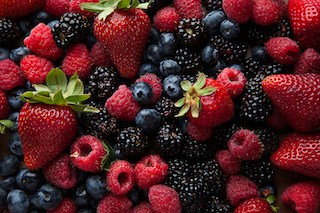If you Google ‘vitamin supplements’ you get 5.260,000,000 results. So I say: plenty of space available on the web for one more blog on this subject 😜. Do we really need vitamin supplements? And do I use them myself? I’ll tell you below. Also why you might need them.
Should you take vitamin supplements?
If you eat healthy, in principle it is not necessary to take extra vitamins and minerals. However, there are groups of people who do not get enough micronutrients through food and drink, or through sunlight (vitamin D), and are advised to take extra vitamins in the form of a supplement (please bear in mind that these are amounts that are advised in the Netherlands. There are different guidelines for different countries, e.g. these for Britain and the US).
| Who? | Daily: |
|
Baby’s until the age of 3 months that are brestfed |
Vitamin K |
|
Children of 0-3 years |
Vitamin D |
|
People in the ages of 0 to 49 who don’t get a lot of sun exposure, cover their skin, or who have colored skin |
10 microgram of vitamin D
|
| Women of 50-69 years | 10 microgram of vitamin D |
|
Women of 70 and older |
20 microgram of vitamin D |
|
Women who want to become pregnant and are in the first 10 weeks of the pregnancy |
400 microgram of folic acid |
|
Pregnant women |
10 microgram of vitamin D |
|
Men of 70 years and older |
20 microgram of vitamin D |
|
Vegans |
Vitamin B12 (check your country’s health institute for the daily amounts) |

In addition, there are groups of people for whom there is no guideline, but who may have an increased need for certain vitamins and minerals:
- Elderly people who eat little, or elderly people with stomach or intestinal infections who can no longer absorb vitamin B12 properly.
- People who eat one-sidedly (this can occur, among others, in alcoholics).
- People who follow an extreme weight loss diet.
In these cases it is advisable to contact a doctor or dietician for personal advice.
What about my vitamin supplement use?
I take a multivitamin every day with no more than 100 percent of the RDA of all substances (many also less than 100 percent), and an additional 10 mcg of vitamin D. I take the vitamin D because I discovered last year that I had a deficiency. Moreover, I am already approaching the age where I need to take extra vitamin D 😄.
I take the multivitamin because I sometimes eat very one-sidedly for a longer period, for example when I am too busy and vary very little in my food (I know, not good…). With those pills I know that I will at least get enough vitamins and minerals.

Replacing fruit, vegetables or… (fill in what you’d rather not eat) with vitamin supplements: good idea?
……?! I get a short-circuit in my brain when asked this question 🤪. Because food is freakin’ delicious, right? And in the future we will probably all only drink one kind of shake anyway 👽, so why would you replace food with a pill 🤔?
But, yes, in theory you can of course replace fruit and vegetables with supplements. In theory you can also slide down a ski slope with a bicycle, but I don’t see anyone doing that anytime soon 😅. I do not recommend, and actually discourage, replacing food with supplements. Because in addition to vitamins and minerals, food also contains fiber and bioactive compounds that improve your health.
Fibres
Fibers, for example in vegetables and fruit, but also in bread, rice and potatoes, keep your intestines healthy and ensure a feeling of satiety. Supplements do not have that effect.
Bioactive compounds
Plants naturally contain bioactive compounds that can promote health. These compounds are also added to some foods. Examples are antioxidants, flavonoids, caffeine, creatine, phytosterols (which inhibit cholesterol absorption, for example added to some (Dutch) margarines. Only take these in consultation with your doctor, by the way) and compounds with a beneficial effect on intestinal bacteria, such as prebiotics.
In principle, your body can do without bioactive compounds. But if you eat a healthy diet and take something from each food group every day, you ensure that you have enough energy and reduce the risk of cardiovascular disease and certain types of cancer.
And as you can read below, when using some supplements you can also ingest too much of certain substances, which can be harmful.

Check this if you use or want to buy a vitamin supplement
Do you want to use a nutritional supplement or are you already using one? Please ensure that the numbers on the bottle below the reference intake do not exceed 100 percent of the recommended daily allowance (RDA).
Consuming more than the recommended amount of vitamins or minerals does not ensure that you benefit more from them. For example, it will not improve your immune system even further.
Taking more of some supplements can even be harmful to your health. For example, if you consume too much vitamin B6 through supplements, you can suffer nerve damage. Therefore, if you do take something extra, the advice is to choose a supplement with no more than 100 percent of the RDA. And definitely don’t for fall the millions of ads and influencer messages out there promoting vitamin supplements. Read more about how to resist bad influencers here.

And now a very boring piece about vitamins and minerals (I’ll keep it short. But with fun facts!)
Vitamins and minerals: why do we really need those micro’s?
Your body needs vitamins and minerals to stay healthy, for energy and for normal growth and development. Vitamins and minerals do not provide calories (= energy) in themselves, but play an important role in generating energy from food. The B vitamins in particular do this, they act as coenzymes and activate enzymes. B vitamins help, among other things, with the metabolism of carbohydrates, fats, amino acids and alcohols for energy. Because your body cannot produce all the vitamins itself, we get them from food.
🥱
I can keep going on and on about which vitamins and minerals are in which foods, how much micronutrients you need, and what they do in your body. But nutrition centers in every part of the world have already done that for me, so that would be a really dry copy-paste story 🧐.

What I think is especially important to emphasise, is: you never eat just one vitamin (yes, with a pill you do, but that’s not what I mean here 🙄), you eat the entire product. For example, you do not eat vitamin C, but a whole orange, which, in addition to vitamin C, also contains fiber. (By the way, Brussels sprouts contain more vitamin C than oranges, did you know? About three times as much 🥬 (substitute for a Brussels sprout emoticon).)
You cannot really call a single nutrient healthy, but you can say something about how healthy a food as a whole is. Your total diet and the products you eat say something about your health. So focusing on a single vitamin doesn’t make much sense (but if you are deficient in one or more, you need to fix that of course!).
Takeaway
So let’s summarize:
- Some groups of people need extra vitamins.
- It is best not to replace fruit, vegetables and other products with a pill, because then you will also miss out on other important substances and effects that supplements cannot offer you.
- Your total diet and the products you eat say more about your health than a single vitamin.
- Food is delicious! But I guess that’s not really up for discussion 😜.
Best wishes,
Femke
